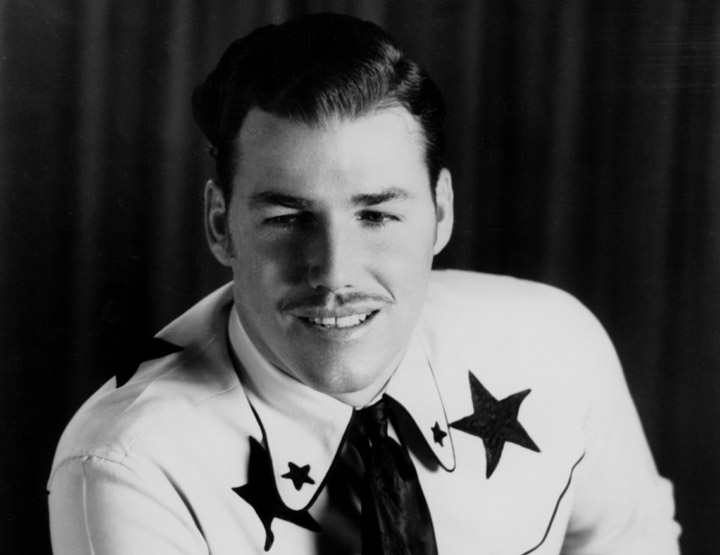MIAMI – Country singer Slim Whitman, the high-pitched yodeler who sold millions of records through ever-present TV ads in the 1980s and 1990s and whose song saved the world in the film comedy Mars Attacks!, died Wednesday at a Florida hospital. He was 90.

Whitman died of heart failure at Orange Park Medical Center, his son-in-law Roy Beagle said.
Whitman’s tenor falsetto and ebony moustache and sideburns became global trademarks — and an inspiration for countless jokes — thanks to the TV commercials that pitched his records.
But he was a serious musical influence on early rock, and in the British Isles, he was known as a pioneer of country music for popularizing the style there. Whitman also encouraged a teen Elvis Presley when he was the headliner on the bill and the young singer was making his professional debut.
Whitman recorded more than 65 albums and sold millions of records, including 4 million of All My Best that was marketed on TV.
His career spanned six decades, beginning in the late 1940s, but he achieved cult figure status in the 1980s. His visage as an ordinary guy singing romantic ballads struck a responsive chord with the public.
“All of a sudden, here comes a guy in a black and white suit, with a moustache and a receding hairline, playing a guitar and singing ‘Rose Marie,'” Whitman told The Associated Press in 1991. “They hadn’t seen that.”
- Green Day targets ICE, Stephen Miller with lyric change before Super Bowl
- 2026 Oscar nominations: ‘Sinners’ makes Academy Awards history with 16 nods
- Firerose accuses ex-husband Billy Ray Cyrus of abuse, posts alleged audio
- Prince Harry takes stand, denies having ‘leaky’ social circle in Daily Mail trial
For most of the 1980s, he was consistent fodder for Johnny Carson’s monologues on late night NBC-TV, and the butt of Slim Whitman look-alike contests.

Get daily National news
“That TV ad is the reason I’m still here,” he said. “It buys fuel for the boat.”
“I almost didn’t do them. I had seen those kinds of commercials and didn’t like them. But it was one of the smartest things I ever did.”
He yodeled throughout his career and had a three-octave singing range. Whitman said yodeling required rehearsal.
“It’s like a prize fighter. He knows he has a fight coming up, so he gets in the gym and trains. So when I have a show coming up, I practice yodeling.”
Born Ottis Dewey Whitman Jr. in Tampa on Jan. 23, 1923, he worked as a young man in a meatpacking plant, at a shipyard and as a postman.
He was able to get on radio in Tampa and signed with RCA Records in 1949 with the help of Col. Tom Parker, who later became Presley’s longtime manager. RCA gave Whitman the show business name Slim — he was a slender 6-foot-1 — to replace his uninspiring birth name.
In 1952, Whitman had his first hit record, “Love Song of the Waterfall,” which 25 years later became part of the soundtrack of the movie Close Encounters of the Third Kind. Another Whitman hit from that year, “Indian Love Call,” was used to humorous effect in the 1996 Mars Attacks! — his yodel causes the Martians’ heads to explode.
He crossed paths with Presley in July 1954 when he starred at a concert in a Memphis park just as Presley — mistakenly billed as “Ellis Presley” in one ad for the show — was launching his career.
According to Peter Guralnick’s book Last Train to Memphis, Presley’s brief, energetic turn on stage caused a wild reaction from the crowd. When Whitman came on for his performance, he told the audience: “You know, I can understand your reaction, ’cause I was standing backstage and I was enjoying it just as much as you.”
With Whitman’s early hits, he became a star on the Louisiana Hayride radio show.
His version of “Rose Marie,” the title song from the venerable operetta that spawned “Indian Love Call,” became a huge hit in England in 1955, staying at No. 1 on the charts for 11 weeks.
Whitman’s other hits included “Have I Told You Lately That I Love You,” ”Red River Valley,” ”Danny Boy” and “I’ll Take You Home Again, Kathleen.”
“The material I did was lasting material,” Whitman said in 1991. “A lot of people thought I wasn’t doing anything, but I was in the studio. The biggest factor is the material you choose. You hunt, you cut.”
He was survived by his daughter, Sharon Beagle, and his son, Byron Whitman.
Whitman told the AP in 1991 that he wanted to be remembered as “a nice guy.”
“I don’t think you’ve ever heard anything bad about me, and I’d like to keep it that way. I’d like my son to remember me as a good dad. I’d like the people to remember me as having a good voice and a clean suit.”









Comments